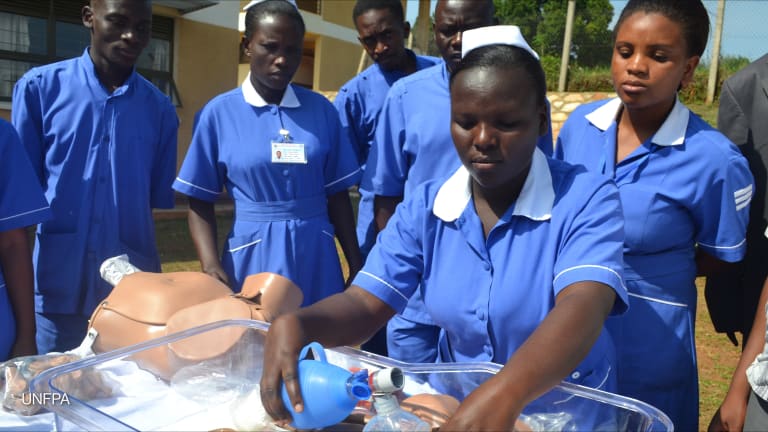Swedish aid: A focus on maternal health
Sexual and reproductive health and rights form a major portion of Sweden's health aid. Devex explores Swedish aid data to learn more about its maternal health funding priorities.
Though significant progress has been made in maternal health over the last few years, approximately 810 women die every day from preventable causes related to pregnancy and childbirth, according to the World Health Organization. Sexual and reproductive health and rights, or SRHR, are an integral part of a well-functioning health system, but there is still a significant lack of funding. Sweden is one of the world’s leading donors for SRHR and is one of the top overall donors of foreign aid relative to the size of its economy. In 2014, Sweden became the first country to implement a feminist foreign policy, a cornerstone of which is SRHR. Support for SRHR accounted for around 60% of Swedish health aid, a figure set to increase. The Swedish government has also been a vocal critic of the White House’s Mexico City Policy, also known as the “global gag rule,” which bars aid funding to any foreign NGO engaged in any abortion-related activities, including education or counseling. In response to the policy’s reinstatement and expansion, Sweden increased its funding for SRHR in 2017. Devex Analytics took a look at Swedish aid for maternal health by analyzing 4,755 Swedish aid disbursements in 2018 and found 225 related to maternal health. In total, Sweden disbursed $5.798 billion worth of official development assistance that year. Out of this, $227 million can be classified as going to maternal health. These disbursements — which included bilateral unspecified aid — spanned nearly 50 countries and regions and encompassed 29 implementing organizations. The descriptions of disbursements were filtered for keywords related to maternal health. Additionally, disbursements were automatically included if they were classified under the sectors of reproductive health or family planning. Devex Analytics went through disbursements related to HIV/AIDS individually to include only those related to women, infants, children, or adolescents. As Openaid.se — the online platform for Swedish aid data — only reports current figures, all figures in this article have been converted to constant ones. All figures considered in this analysis are for positive disbursements, so a total of $898,517 in repayments has been excluded. Aid type and extending organizations In 2018, 99% of Swedish aid for maternal health was core support for NGOs and civil society, public-private partnerships, and research institutes. With the exception of 14 disbursements implemented by the Swedish Research Council — which, at under $1 million, accounted for less than 1% of maternal health aid — all were implemented by the Swedish International Development Cooperation Agency, or Sida. Two disbursements were classified as public-private partnerships. Sida partnered with The African Women's Development and Communication Network, or FEMNET, to implement FEMNET phase II — a disbursement valued at $586,000 — to build the capacity of women's rights organizations on the African continent. FEMNET is a pan-African, membership-based feminist network based in Nairobi. The partnership aims to strengthen African women's rights, with a focus on abortion, child marriage, and female genital mutilation in the sub-Saharan region. Another disbursement, valued at $556,333 of bilateral unspecified aid, is between Sida and the Partnership for Maternal, Newborn & Child Health, a multiconstituency alliance hosted by WHO. Location Sweden disbursed aid with a focus on maternal health to nearly 50 countries and regions in 2018, in addition to bilateral unspecified aid. The three countries that received the most aid were Zambia at around $18 million, Uganda at around $14 million, and Myanmar at around $12 million. About half of ODA went to specific countries, and the remainder was split between bilateral unspecified and regional aid. Bilateral unspecified aid comprised a quarter of Swedish aid for maternal health in 2018. The majority of this aid was given to experts and other technical assistance, and 30% of this aid was core contributions and pooled programs and funds. Most bilateral unspecified aid went to three organizations: WHO received over 40%, the International Planned Parenthood Federation received over 20%, and Riksförbundet för Sexuell Upplysning received 20%. Zambia was the nation that received the most Swedish aid for maternal health in 2018 at $18 million, which accounted for 15% of aid for specific countries. The top disbursements for Zambia were aimed at health support for women, children, and youths and framework support. Uganda received over $13 million, or over 10% of aid for specific countries. The main focuses of these disbursements were teenage health and United Nations programs on gender-based violence and maternal and newborn health. Myanmar received almost $12 million, or 10%. Disbursements were aimed at SRHR in conflict areas and SRHR education. Other disbursements were framework support for the Church of Sweden and Diakonia. The region that received the most aid was sub-Saharan Africa at around $40 million, or 18% of total aid. Half of this aid went to two disbursements. Almost $12 million went to 2gether 4 SRHR, a program implemented by the United Nations Population Fund, a partner of Sida. It will be distributed to the SRHR team at the Swedish Embassy in Lusaka, Zambia, as part of a joint funding proposal from UNFPA, UNAIDS, UNICEF, and WHO. The program focuses on increasing SRHR for adolescent girls, youths, and key populations in the eastern and southern Africa region. The other top disbursement in sub-Saharan Africa was valued at $9 million, or 22% of Swedish aid for the region, for a 2018-2022 UNESCO program called Our Rights, Our Lives, Our Future. This focuses on comprehensive sex education that empowers adolescents and young people in 10 focus and 21 networking countries and involves ministries of education, health, youth, gender, chiefs, traditional affairs, community development, and family affairs, as well as civil society organizations. NGOs and civil society and multilateral organizations receive the most funding In total, 57 organizations received Swedish aid for maternal health in 2018. NGOs received 42% of total funding, while civil society and multilateral organizations received another 42%. Plan International’s Sweden office received the most funding of any NGO and received the third-most funding overall. Of this funding, 98% was core contributions and pooled programs and funds as support through Swedish civil society organizations for the 2010-2016 period. This program had four main thematic focus areas — right to education, right to SRHR, citizenship and governance, and disaster risk reduction — all with the aim of boosting SRHR for adolescents. This program was implemented across 22 countries and regions, with the most funding — $2.7 million — going to Zimbabwe. The next NGOs and civil society organizations receiving the most funding were the International Planned Parenthood Federation and Riksförbundet för Sexuell Upplysning. UNFPA received $37.5 million, making it the top multilateral organization as well as the top organization overall. Sweden maintains a long-standing partnership with UNFPA to improve maternal health worldwide. Sweden is also the largest donor of core support to UNFPA and pledged increased support to UNFPA with $286 million in unearmarked funding from 2018 to 2021. WHO received the second-most Swedish aid in 2018, totaling $24 million or 11% of maternal health aid. All of this was core contributions and pooled programs and funds toward research including SRHR, and the funding was channeled through Sida. Public sector institutions comprised approximately 15% of the total funding amount, making them the third-largest channel of funding. Recipient governments received almost 40% of funding, followed by the Swedish government, teaching or research institutions, and the Church of Sweden. Public-private partnerships and networks comprised only 1% of funding, making them the channel with the least funding. These partnerships included the broad classification of networks, the private sector in Sweden, and other financial corporations. For access to in-depth analysis, insights, and funding opportunities from over 850+ sources — combined with Devex Pro news content — sign up to a Pro Funding subscription online today or get in touch to learn about our Pro Funding group options.
Though significant progress has been made in maternal health over the last few years, approximately 810 women die every day from preventable causes related to pregnancy and childbirth, according to the World Health Organization. Sexual and reproductive health and rights, or SRHR, are an integral part of a well-functioning health system, but there is still a significant lack of funding.
Sweden is one of the world’s leading donors for SRHR and is one of the top overall donors of foreign aid relative to the size of its economy. In 2014, Sweden became the first country to implement a feminist foreign policy, a cornerstone of which is SRHR. Support for SRHR accounted for around 60% of Swedish health aid, a figure set to increase.
The Swedish government has also been a vocal critic of the White House’s Mexico City Policy, also known as the “global gag rule,” which bars aid funding to any foreign NGO engaged in any abortion-related activities, including education or counseling. In response to the policy’s reinstatement and expansion, Sweden increased its funding for SRHR in 2017.
This story is forDevex Promembers
Unlock this story now with a 15-day free trial of Devex Pro.
With a Devex Pro subscription you'll get access to deeper analysis and exclusive insights from our reporters and analysts.
Start my free trialRequest a group subscription Printing articles to share with others is a breach of our terms and conditions and copyright policy. Please use the sharing options on the left side of the article. Devex Pro members may share up to 10 articles per month using the Pro share tool ( ).
Emma Stibi works with the Devex Analytics team based in Copenhagen, where she assists in curation, analysis, and dissemination of development data. She is currently finishing her bachelor’s degree in development studies at Lund University and has also studied in the U.S. and Korea. Her interests include gender equality and disaster risk management.
Maja Wisenberger works in Devex's Analytics team in Manila, assisting in expanding data content and analyzing global funding trends. She has a master's degree in Public Policy from China and she brings experience from UNOPS, UN Women and the nonprofit sector. Her main areas of interest are poverty alleviation, economic and gender equality, and Chinese philanthropy.









